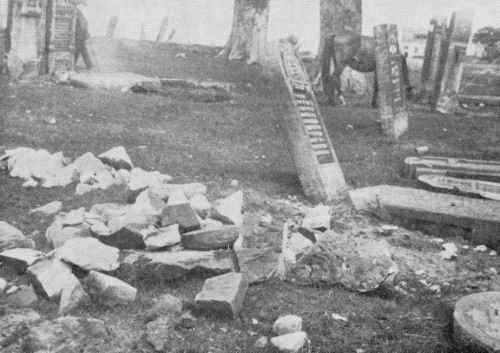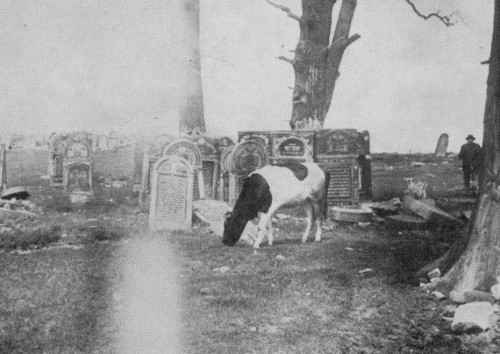Mayer Blankman returning to Ostrowiec Jewish Cemetery
Translated by Tina Lunson
A short time ago I returned to Poland after an absence of more than six years, during which I was homeless and driven from my beloved home.
Once I had only placed one foot on Polish soil I considered it my sacred duty to travel to my hometown of Ostrovtse, in order to find out the fate of my near and dear who had remained there after my escape from Poland during the German occupation.
To my great pain and sorrow I found out that of my large, many–branched family, and of all my relatives, close friends, colleagues and acquaintances – no one had save himself from the horrible catastrophe. All were tragically murdered in the terrible years of the Nazi occupation of Poland.
I went to the graves of my parents at the Jewish cemetery. I wanted to seek out at least the graves of my nearest and dearest, who had died a natural death just before the Nazi devastation.
A shocking scene revealed itself before my eyes: the fence that had once enclosed the cemetery on all sides – was destroyed and in ruin. Many gravestones were broken and hacked to pieces.
|
|
Of the many thousands of gravestones very few remained. Cows, goats and pigs pastured themselves freely in the cemetery and no one disturbed them. The cemetery was abandoned, lawless. The worst part was that the very few remaining gravestones were also ruined, broken, made unclean, desecrated and violated by hooligans.
People told me that the Germans had, during the occupation, torn up the gravestones and paved the sidewalks along the streets of the Jewish towns and villages in Poland. I myself, during my visit in Ostrovtse, stumbled upon gravestones in the sidewalks, from which the square Jewish letters and the traditional “P”N” at the head screamed out. The danger threatened that very soon the cemetery would disappear entirely and that no trace of it would remain!
I decided to intervene in that painful matter which would not let me rest and pressed heavily on my conscience. I went to the town hall, to the town president, Mr. Bushko. I explained to the president that every cemetery in the entire world, no matter what people it belongs to – should be protected and respected, and that it was very unseemly in the new Poland for the Jewish cemeteries to be found in such a neglected and abandoned condition after the war…
The town president, Mr. Bushko, listened to me without comment and professed great understanding for my concern about the sad state of the Jewish cemetery. But he declared that the town president can do nothing to help. Putting up a new fence around the Jewish cemetery would cost a lot of money, Poland is in ruins after the war, the state treasury was empty
|
|
| The cemetery has been truned into a pasture |
and there was no money for the most necessary needs. Plus the Polish youth were very demoralized after the Nazi occupation and they disturbed and abused the remaining Jewish gravestones. He promised me to place wooden signs around the cemetery with warnings that anyone who broke gravestones or desecrated the cemetery would be harshly punished. I do not know whether he kept his promise. I left that Jew–clean Ostrovtse and went to Warsaw.
As I gleaned from Jews in many other towns and villages in Poland, the same sad situation reigned everywhere. Besides the terrible desecration of something sacred, our cemetery had important historical significance. Our cemeteries are pieces of Jewish history. Generations upon generations of Jews, among them many writers, poets, scholars and artists who lived, affected, created and died on that very earth.
I believe that Jewish society everywhere, our brothers and sisters in the larger world, are forbidden to remain indifferent and must earnestly interest themselves in the ongoing question of how to rescue that which still remains, if it is not already too late.

